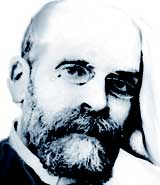
www.alcoberro.info/imatges/durkheim.jpg
Durkheim

www.alcoberro.info/imatges/durkheim.jpg
Repressive Law vs. Restitutive Law
"The
nature of the collective conscience should account for the punishment
of its criminals, as it is one of the driving forces of society."
-Emile Durkheim
Emile Durkheim stated that there were two kinds of law- repressive and restitutive. He linked repressive law to mechanical solidarity, and restitutive law to organic solidarity. Durkheim, as stated in an article by Mathieu Deflem, "believed that social life takes a definite and organized form and the best indicator of this organization is law," (Deflem). He studied repressive law and restitutive law as a way to determine how society was changing in both division of labor and collective consciousness. Law is "an expression and guarantee of society's fundamental values," (Wikipedia). Durkheim found that society was moving away from mechanical solidarity (strong collective conscience) and into organic solidarity (weak collective conscience), and this was observable through the transition in law.
According to Ritzer, repressive law is defined as "a form of law in which offenders are likely to be severely punished for any action that is seen by the tightly integrated community as an offense against the then-powerful collective conscience, "(16). Whereas, Ritzer defines restitutive law as a law in which individuals are "simply to be asked to comply with the law or to repay those who have been harmed by their actions," (17). These two laws are on complete opposites in terms of punishment severity.
A few examples of repressive law include the death penalty here in the United States and the guillatine used during the French Revolution. All of these examples are extreme and harsh in the way the people who were in the wrong were punished, yet these punishments were and are socially accepted due to the level of class consciousness and the amount of solidarity in the culture. Here in the United States, we have high moral values and tend to stick with the majority opinions. Anyone who goes against those opinions are considered to be in the wrong. Repressive law, according to Janet Abu- Lughod, is "counter-productive" and that it "served its purpose, but it has outlived its usefulness," (Abu-Lughod). This was her opinion following the 9/11 attacks on the World Trade Center and the country's executive and military responses to how to punish our attackers.
As for restitutive law, Durkheim felt that it was the "solution for the breaking of formal rationalization or law in a modern organic society," (Young). Canada is a good example of a country that uses repressive law. It is a society with organic solidarity, meaning a weak collective conscience. Canada "lacks definitive sets of rules that make someone guilty" (Young) and it is not very clear what crimes are and are not serious. Restitutive law is more favored today than in the past because it "observes modern ethical guidelines" (Young) and society as a whole benefits from the convicted being punished.
Not every society is strictly mechanical or organic in terms of solidarity. Some in today's world are a mixture of both when it comes to using both repressive and restitutive laws, which is perhaps the perfect balance.
References
Abu-Lughod, Janet. 2001. "After the WTC Disaster: The Sacred, the Profane, and Social Solidarity." http://www.ssrc.org/sept11/essays/abu_lughod_text_only.html 7 September 2008.
Deflem, Mathieu. 2007."Sociological Theories of Law." p.1410-1413 in Encyclopedia of Law and Society: American and Global Perspectives. Clark, David. Thousand Hills, CA. Sage Publications. http://www.cas.sc.edu/socy/faculty/deflem/zencyL&Ssoclaw.html. 6 September 2008.
Fenton, Steve. "Durkheim and Modern Sociology." Great Britain:Cambridge University Press. http://edurkheim.tripod.com/id22.html. 6 September 2008.
Ritzer, George. Contemporary Sociological Theory and Its Classical Roots, 2nd Edition. McGraw-Hill, New York. 2007.
Wikipedia. 2008. "Emile Durkheim." http://en.wikipedia.org/wiki/Durkheim#Law 7 September 2008.
Young, Stephen. 2007. "Collective Conscience in Modern Society." http://www.socyberty.com/Sociology/Collective-Conscience-in-Modern-Society.69775 8 September 2008.
http://science.jrank.org/pages/11185/Sacred-Profane--MILE-DURKHEIM.html